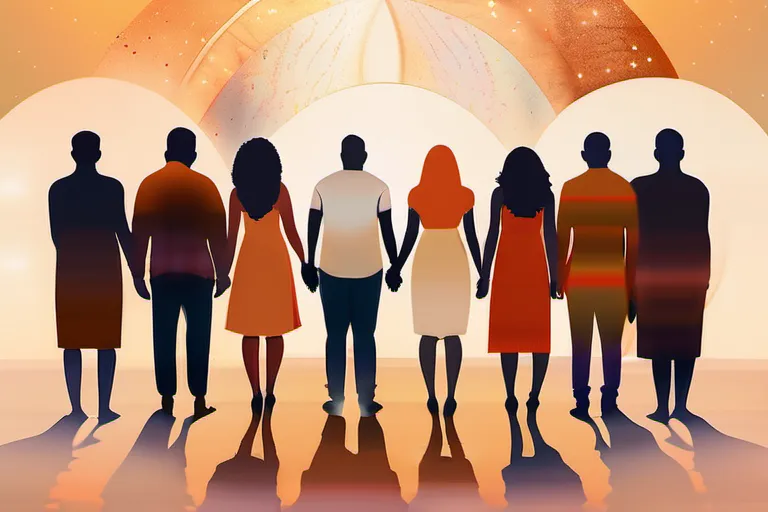Exploring the role, benefits, and challenges of a universal approach to religion in our diverse world.
In today’s globalized society, the concept of universal religion has gained significant attention. This article delves into the importance of a universal religious approach in today’s multicultural world, discussing its role, benefits, and challenges.
Understanding Universal Religion
Imagine religion as a vast ocean, with each faith being like a river that flows into it. A universal religion would be akin to a single, expansive sea where all these rivers come together, blending yet preserving their unique identities. But why is this important in today’s society?
Why does the world need a universal approach to religion?
In our increasingly interconnected and diverse world, conflicts arise not just from political or economic differences but often from deeply rooted religious beliefs. A universal religion could serve as a common ground where people of different faiths find harmony instead of division. It would foster understanding and respect for each other’s beliefs and practices.
Think about it: if we could see the world through one shared lens, wouldn’t it be easier to bridge gaps between communities? Wouldn’t this approach help us navigate the complexities of our global society with greater ease and compassion?
The challenge lies in creating a framework that respects all religions without diluting their core values. It requires careful consideration of how different beliefs can coexist and thrive together, much like finding a way to harmonize different musical notes into a beautiful melody.
Wouldn’t it be transformative if we could approach global issues with a unified spiritual perspective? A universal religion could act as the glue that holds our diverse world together, promoting peace and cooperation across boundaries. After all, isn’t our shared humanity what ultimately connects us?
The Role of Universal Religion in Fostering Unity
Imagine religion as a vast ocean, with countless rivers and streams that flow from it. Each river represents different religious beliefs and practices, all originating from the same source but taking unique paths across the world. In today’s diverse society, how can we ensure these rivers meet in harmony, fostering unity instead of conflict? A universal religion could be the bridge that connects them.
Historically, religions have often been seen as barriers, dividing people based on beliefs and practices. But what if we looked at it differently—what if every river flowed towards a common point, where all could come together to drink from the same source of wisdom? This universal approach could transform religious communities into a tapestry of faiths woven tightly together, promoting mutual understanding and respect.
Consider the idea of a universal religion as a global village square, where people from all walks of life gather to share stories, learn from each other, and build bonds. In this setting, rather than being seen as outsiders or intruders, different faiths become complementary parts of a larger, more inclusive community. This not only enriches the spiritual lives of individuals but also strengthens social cohesion at large.
Moreover, universal religion can play a crucial role in mediating conflicts between communities. When people understand and respect each other’s beliefs, misunderstandings often diminish. Imagine two neighboring villages with different religious backgrounds; instead of mistrust leading to tension, shared religious teachings and practices could serve as a neutral ground for dialogue and cooperation.
The path towards universal religion is not without its challenges. It requires a deep commitment from both individuals and institutions, along with a willingness to embrace diversity and inclusivity. But the potential benefits are immense—fostering peace, unity, and mutual understanding in a world where these values are more needed than ever.
Benefits of a Universal Approach to Religion
Imagine a world where everyone shares the same spiritual values, beliefs, and practices—wouldn’t that be a utopian society? A universal approach to religion might seem like a lofty goal, but it could offer profound benefits in today’s complex, interconnected world. By adopting a more inclusive religious framework, we can bridge the gaps between different cultures and communities, fostering a sense of global unity and cooperation.
Firstly, a universal religion would provide a common ground for people from diverse backgrounds to connect. In an increasingly globalized society where individuals are constantly moving across borders, having shared spiritual values could help ease integration and reduce misunderstandings. It’s like planting seeds in a garden; if everyone uses the same type of soil and nutrients, the plants grow stronger together.
Secondly, adopting a universal approach to religion could enhance social cohesion. In societies where people practice different religions or follow none at all, there can often be tensions and conflicts. By promoting shared values such as compassion, justice, and respect for others, a universal religion could act like a glue, binding communities together. It’s akin to the way a river unites scattered towns along its banks, creating a network of interconnectedness.
Moreover, a unified religious framework might help tackle global issues more effectively. From climate change to social justice, many challenges require collective action and shared commitment. If religion could become a force for unity rather than division, it could mobilize people towards common goals with greater ease. It’s like having a map that guides all travelers on the same path, ensuring they reach their destination together.
In summary, embracing a universal approach to religion offers numerous advantages in today’s society. From promoting unity and understanding to addressing global challenges, the potential benefits are vast. However, achieving such an inclusive religious framework is not without its complexities, which we will explore in our next chapter. For now, let’s ponder: could a unified spiritual path truly transform our world?
Challenges Faced by Universal Religion
The journey towards a universal religion isn’t just about merging different belief systems; it’s like trying to blend oil and water. How do we preserve the unique cultural heritage that each tradition carries? Isn’t it the very essence of a culture that defines its people, making it hard to integrate without losing identity?
Take for instance the concept of cultural preservation. Each religion has deeply rooted traditions, symbols, and practices that are integral to the community’s sense of self. If we were to create a universal religion, wouldn’t we risk diluting these unique expressions? How can we ensure that the rich tapestry of human culture is not reduced to a single, homogenized cloth?
Another challenge lies in individual freedom. Freedom to believe and practice one’s own religion is a cornerstone of many societies. A universal approach might seem like an invitation for conformity, stripping individuals of their personal spiritual identity. Can we really expect people to give up the deeply personal rituals that have been passed down through generations?
The path forward must be nuanced. We need to find ways where cultural practices can coexist within a broader framework without diminishing individuality. Perhaps one solution lies in recognizing and respecting pluralistic inclusion, where elements from various religions are integrated but retain their unique flavors, much like the vibrant colors of a mosaic come together to form a harmonious whole.
In conclusion, while the idea of universal religion offers many benefits, it’s crucial that we address these challenges with care and respect. The key lies in finding common ground where diverse traditions not only coexist but also enrich each other, creating a more inclusive and understanding world for all. Can this be achieved? Only time will tell, but every step forward brings us closer to the dream of unity in diversity.
Addressing Challenges for a Harmonious World
Addressing Challenges for a Harmonious World: Propose Solutions to Overcome the Obstacles Faced by Universal Religion
Imagine a world where differences in faith and beliefs are not seen as barriers but as bridges, connecting people from diverse backgrounds. How can we ensure that universal religion thrives while respecting individual freedom and cultural identity? The answer lies in finding common ground through dialogue and mutual understanding.
How do we bridge the gap between different religious practices?
- Create interfaith dialogues where leaders from various religions can come together to discuss shared values and principles. This not only fosters respect but also encourages a deeper understanding of each other’s beliefs.
- Implement educational programs that teach about the diversity within religions, highlighting commonalities rather than differences. By focusing on what unites us, we can build stronger, more inclusive communities.
Cultural preservation and individual freedom are essential, but how do we ensure both coexist with a universal approach?
- Support cultural festivals and traditions within religious frameworks. This recognition helps preserve cultural heritage while acknowledging the broader spiritual unity among followers of different faiths.
- Encourage personalized practices that align with individual beliefs without compromising on the core tenets of a universal religion. This flexibility allows for personal growth and spiritual fulfillment, enriching the collective experience.
How can we foster a sense of belonging among those who follow a universal religion?
- Develop inclusive worship spaces that celebrate diversity while maintaining a shared spiritual identity. These spaces should be welcoming to all, regardless of their background or specific religious practices.
- Create online communities and support networks where people can connect, share experiences, and find comfort in a supportive environment. These virtual platforms can serve as important tools for building a sense of community among followers worldwide.
By addressing these challenges head-on, we can pave the way for a more harmonious world where universal religion thrives, bringing people together under a common banner of peace and unity. Let us work towards creating such a world, one dialogue at a time.
The Future of Universal Religion
The future of universal religion seems to be on the horizon, a beacon of hope amidst the chaos of our increasingly globalized world. Could this new approach actually bridge the vast cultural and religious divides that often lead to conflict? Imagine if every person, regardless of their background or beliefs, could find common ground in shared spiritual values and practices. Wouldn’t that be a remarkable transformation?
The idea of universal religion is not just theoretical; it’s gaining traction as societies become more interconnected. As we navigate the complexities of our diverse world, the concept of finding a common denominator among all religions might seem like an impossible task. However, isn’t every major religion rooted in similar ethical principles such as love, compassion, and justice? Could these core values form the foundation for a universal religious framework?
The evolution towards a universal religion could see the development of new forms of worship that are inclusive and accessible to all. Imagine places of worship that celebrate the best aspects of various traditions without diminishing any. Wouldn’t it be revolutionary if such spaces became centers for community building and dialogue? These locations could serve as hubs where people from different backgrounds come together, fostering understanding and respect.
Predictions about the future suggest that universal religion might also influence political and social policies. If a shared spiritual framework can unite people, it might encourage leaders to prioritize peace and cooperation over division. Could this be the key to solving some of the most pressing issues we face today—such as climate change or global inequality? Wouldn’t it be transformative if religious leaders from all walks came together to address these challenges?
However, despite its potential benefits, universal religion also faces significant hurdles. One major challenge is the reluctance of traditionalists who might view such an approach as diluting their faith’s authenticity. Another is ensuring that this universal framework respects and preserves the unique cultural expressions within each tradition. Can we find a balance between unity and diversity?
The future of universal religion is not just about creating a new religious paradigm; it’s also about nurturing an inclusive, compassionate society where everyone feels seen and heard. As our world continues to evolve, the role of universal religion in shaping this future will become increasingly vital. Will we embrace this path towards unity or stick with the status quo? The choice is ours.
Conclusion
 Universal religion can foster unity, promote peace, and encourage mutual understanding among diverse communities. However, it also faces obstacles such as cultural preservation and individual freedom. By addressing these challenges, we can create a more harmonious world through the power of shared beliefs.
Universal religion can foster unity, promote peace, and encourage mutual understanding among diverse communities. However, it also faces obstacles such as cultural preservation and individual freedom. By addressing these challenges, we can create a more harmonious world through the power of shared beliefs.











